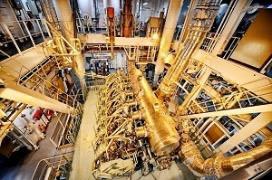
4 minute read
BIOFUELS
from CSI Autumn 2021
by Maritime-AMC
The marine fuel market is rapidly evolving. Low and zero carbon fuels have been readily distinguished as key to fulfilling impending global decarbonisation targets, resulting in a huge increase in the production and development of “future fuels”, as Teemu Jutila of Auramarine explains

Teemu Jutila Director of Engineering and Products, Auramarine
FACING THE
FUTURE
Questions about the supporting infrastructure, quality and cost of so-called future fuels — as well as the pressure of day-to-day operations — is halting industry uptake, with uncertainty leading to some shipowners stalling newbuild orders. Building shipowner and operator confidence in newer fuels is becoming increasingly important and relies on critical factors, such as financial viability, fuel supply infrastructure as well as availability.
One such existing clean fuel that continues to make quick progress is biofuel. In fact, several leading maritime organisations, such as The Finnish Maritime Industry, have stated that biofuels “could use the existing bunkering infrastructure with minor modifications and therefore show a strong potential to replace part of the fuel mix”.
Likewise, moves from major industry influencers —such as Trafigura, which recently started trialling biofuels across its fleet — indicate that it is set to have an increasing market share.
At Auramarine, we view biofuels as one of the most feasible and effective low-carbon future fuel options. Our 45 years of expertise, designing and manufacturing fuel supply systems for a wide range of fuels, has led us to conclude that the fuel, when sustainably produced, will play a key role in ensuring the future decarbonisation of the shipping industry.
INSPIRING CONFIDENCE
The continuation of research, widespread industry collaboration and a meticulous approach is required if we are to fully realise biofuels. The uptake of biofuels — as with any future fuel — relies on a high attention to detail and scrutiny of infrastructure and operations across the entire supply chain.
With this in mind, and to further support shipowners and operators in the transition, we are working with industry leaders on the three-year collaborative BioFlex project to determine the most ecologically and economically sustainable way to evolve

Industry players are working together to progress the use of biofuels
the marine energy supply chain and replace fossil fuels.
The project is funded by Business Finland, VTT Technical Research Centre of Finland and participating companies, and enacted by VTT and companies Auramarine, Fortum, FG-Shipping, Neste, Pohjanmaan Hyötyjätekuljetus, Polartek, St1, Valmet and Wärtsilä.
Working alongside research centres, fuel suppliers and engine manufactures, we will harness our expertise to progress the use of biofuels as a viable new source of energy and propulsion by analysing the impact of the fuel on a vessel’s fuel supply units.
For example, biofuels can be corrosive and wearing on metals; the acidity, reactivity, filtration properties and coagulation of biofuels requiring carefully tailored specialised solutions, such as acid-proof materials, dedicated heating procedure and careful insulation. We are applying our expertise to ensure that every element of material used in a vessel’s fuel supply unit is examined to ensure a safe environment for the fuel and subsequently the wellbeing of those on board.
LOOKING AHEAD
With every ship unique in its design, purpose and history, we offer an expert technical review of the ship’s or fleet’s fuel supply system to determine the best possible adaptation of existing on-board fuel supply systems to handle new fuels.
We also believe that crews’ knowledge of the fuel in use is vital to ensure biofuels are managed correctly. For example, it is important to know whether the fuel has been blended before bunkering or on board, what is the cloud point and recommended storage conditions to avoid the occurrence of costly sludging and disturbances.
If there are several fuels in use, each must have a dedicated tank and the changeover process must be controlled properly.
In terms of looking to the future, we believe biofuels are one of the most viable low-carbon fuel options available to the shipping industry. For this to be effective, we are not only continuously developing our offering in pace with the latest developments, but also designing a new product family aimed at supporting the use of biofuels to meet the demands of the new market dynamics.
As with all major changes in shipping, there will be hurdles to overcome to enact significant transformation. Fundamentally, we believe a thorough and consultative approach consisting of widespread industry collaboration, expert advice, counsel, and on hand support is required.
This is vital to not only ensure the safety, efficiency, and continuity of vessel operations, but to ensure the reputation and integrity of biofuel as a viable future fuel.










